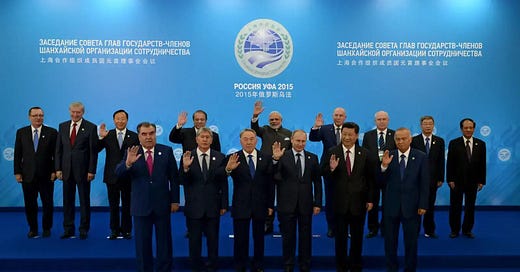A cast in search of a play seems an apt phrase to describe the Shanghai Cooperation Organization, the security and defense organization launched in 2001 by China and Russia. The SCO ended its annual meeting, this year in Astana in Kazakhstan, by adding a new member, Belarus, thus further extending its boundaries to the borders of the European Union and NATO.
But the addition in no way clarified the purpose of the organization, whatever claims China and Russia might make from time to time that it was further evidence of solidarity against western hegemonism. In Astana, President Putin declared that the SCO was “one of the key pillars of a fair, multipolar world. In practice, the SCO has become more of a sounding board reflecting the often-shifting relationships between its members.
The SCO was formed in 2,001 primarily on the initiative of China then, like Russia, worried about the spread of radical Islam and separatism in Central Asia. It was the successor to an informal group of five that first met in 1996 in Shanghai, the other original members being from Soviet Muslim-majority states Kazakhstan, Tajikistan, and Kyrgyzstan, with Uzbekistan joining in 2001. It fit well with China’s ambitions of extending its influence in Central Asia while for the Russians it was a potential stabilizing force. It suited the Kazakhs in particular who wanted to be seen as a trade corridor between east and west and it fit well with China’s ambitious Belt and Road initiative launched in 2013.
However, its political uses proved rather limited and over time the Russians found that fellow members were reluctant to support it whether over its meddling in the disputes in the Caucasus, or its annexation of Crimea in 2014. and most recently its full-scale invasion of Ukraine.
What appeared to make the SCO more important was the joining of India and Pakistan in 2017. Whatever the motives of China and Russia consenting to this, in reality, it just added to existing contradictions. Both joined to neutralize the other and in the case of India at least as a potential way of diluting China’s influence while sustaining its long-time friendly relationship with Moscow. However, this time Prime Minister Narendra Modi was conspicuous by his absence in Astana.
Iran joined in 2022 but has kept a low profile. In time it could add diplomatic and trade weight to the SCO, but given its relative isolation, it can currently do neither, least of all while Afghanistan under the Taliban remains a near-pariah state. Under other circumstances, and if the SCO itself was trade-oriented, Iran could be an important member of a regional trade grouping. But it is not. The SCO has a bureaucratic committee to encourage business cooperation but in practice, any deals are bilateral, not multilateral.
Turkey is a Dialogue Partner and Erdogan honored the meeting with his presence but there was little sign that Turkey intends to upgrade its status to that of Observer. Now that Belarus has joined, only Mongolia and Afghanistan have this status while there is a long list of Dialogue Partners including Cambodia and the Maldives.
With Kazakhstan the host this year, the meeting provided an opportunity for Xi Jinping to enhance China’s standing with a state visit. The SCO thus helps the balancing act that Kazakhstan must perform given its historical relations with Russia, its significant Russian minority, and President Tokayev’s debt to Russian forces under the banner of the Collective Security Treaty Organization comprising Russia and five ex-Soviet states, at the time of unrest in 2022. Nonetheless, Kazakhstan conspicuously failed to support Putin’s subsequent invasion of Ukraine.
The SCO’s theoretical size and occasional anti-western sentiments have made some in the west exaggerate its importance as a potential counter to NATO. In practice, the SCO just reflects the complexity of power relationships in eastern and central Eurasia, not least when Russia is strengthening its relations with North Korea, to the evident worry of China, and when the future of Iranian hostility to the west may be in the balance. Nonetheless, its existence is modestly useful to China, somewhat less so to Russia, but benefits the four other original members in balancing their relations with the two giants. As for India, its benefit lies in ensuring that little of substance is ever likely to emerge from it.




Let's hope the SCO continues being full of hot air and worthless intrigue !